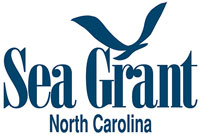2016 Coastal Policy Fellows Named
Contact:
Lisa Schiavinato, 919-515-1895, lisa_schiavinato@ncsu.edu
E-Ching Lee, 919-515-9098, eching_lee@ncsu.edu
Posted Thursday, January 28, 2016
Alyssa Dykman and Michael Flynn are the 2016 Coastal Policy Fellows. The fellowship, supported by North Carolina Sea Grant and the N.C. Coastal Resources Law, Planning and Policy Center, is designed to foster research on a policy issue within the state’s 20 coastal counties during an academic semester.
“I’m excited about the projects from our 2016 fellows. Their research has the potential to provide our coastal communities and coastal tourism industry with critical local information that can help them plan for the future. I’m looking forward to working with Alyssa and Michael to ensure their science and policy data reaches these audiences,” says Lisa Schiavinato, co-director of the center and Sea Grant law, policy and community development specialist.
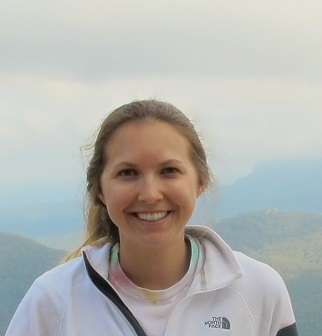
Alyssa Dykman
Dykman is working toward a Master of Environmental Management degree at Duke University’s Nicholas School of the Environment, concentrating in coastal environmental management. Her advisor is Grant Murray, a faculty member at Duke’s Marine Lab who focuses on marine policy.
“This fellowship will expand upon my current master’s project that involves developing a sustainable tourism framework for the Outer Banks National Scenic Byway,” she says.
Dykman will conduct surveys to understand and characterize the motivations of tourists for visiting the region and their perceptions of sustainable tourism. She also will interview local and state tourist facilitators to gain a deeper understanding of the region’s tourism industry and policies.
Dykman, who grew up in New Fairfield, Ct., holds a bachelor of science degree in environmental studies from the University of Southern California in Los Angeles.

Michael Flynn
Flynn is a doctoral student in the Coastal Resources Management program at East Carolina University, with a focus on geoscience, social science and coastal policy. His advisor is Tom Allen, a faculty member in ECU’s geography department.
“This project will quantify the susceptibility of individual buildings located within the eight unincorporated communities along Cape Hatteras National Seashore to coastal hazards,” Flynn explains.
With that data, he will make projections to determine when to introduce mitigation measures. The Hamilton, N.J., native also will focus on evaluating the effectiveness of existing local, state and federal policies related to coastal development and sustainability, as well as their effect on coastal zone management in the region.
Flynn received his bachelor of science degree in biology, with minors in marine science and writing, and a Professional Science Master’s in Environmental Science from Stockton University in Galloway, N.J.
For information about the fellowship, go to https://ncseagrant.ncsu.edu/nccoastallaw/fellowships/coastal-policy-fellowship/.
Shape of the Coast Set for February
Contact:
Lisa Schiavinato, 919-515-1895, lisa_schiavinato@ncsu.edu
Updated February 11, 2016 due to a change of one of the speakers. Originally posted Friday, January 15, 2016.
The 2016 Shape of the Coast is scheduled for 8:00 a.m. to 12:30 p.m. on Feb. 12, at the Friday Center in Chapel Hill. This event is part of the University of North Carolina at Chapel Hill’s School of Law Festival of Legal Learning.The coastal session is co-sponsored by the N.C. Coastal Resources Law, Planning and Policy Center; North Carolina Sea Grant; and the UNC Chapel Hill’s School of Law.
“This year’s program includes a set of timely and robust coastal law topics. Participants will learn how attorneys can most effectively work with scientists as expert witnesses, and about recent and ongoing litigation related to our public trust beaches,” notes Lisa Schiavinato, center co-director and Sea Grant coastal law, policy and community development specialist.“Whether you’re an attorney, business owner, scientist, regulator or policymaker, you’ll have a chance to learn about coastal law issues that are relevant to you as a professional.”The discussions will include:
- “Coastal and Marine Science: How To Engage with Expert Witnesses” by Greg D. Icenhour, Vice President and Charlotte Branch Manager for Mid-Atlantic Associates, Inc., headquartered in Raleigh;
- “Public Trust Beaches and Private Property Rights: A Look at Recent North Carolina Cases and Their Potential Implications” by Brian Edes, Crossley, McIntosh, Collier, Hanley & Edes, P.L.L.C.; and by Ben Gallop, Hornthal, Riley, Ellis & Maland, L.L.P.;
- “What’s Ahead for North Carolina Coastal Policy?” Neal Andrew, vice chair, N.C. Coastal Resources Commission; and
- “Federal and State Coastal Case Law and Legislative Update” by Todd Roessler, Kilpatrick Townsend & Stockton L.L.P., and by Merrie Jo Alcoke, Ward and Smith, P.A.
Attorneys may earn Continuing Legal Education credit for attending. Other professionals and members of the public also are invited to participate. Fees are $125 for those wishing to earn CLEs, and $100 for those who do not. Any media interested in attending should contact Schiavinato at 919-515-1895 or lisa_schiavinato@ncsu.edu.
To register, visit www.law.unc.edu/cle/festival. On the left panel, click on Program. Select the Shape of the Coast course for each of the first four sessions (01 thru 04) on Friday, Feb. 12. Then hit the Register Now button. On the next page, enter your first and last name. Select Continue to proceed to the Add My Information page. In the drop-down menu for Event Fee, choose your preferred payment option for Shape of the Coast Special Rate — with or without CLEs.
For any additional questions on the registration process, contact Schiavinato at 919-515-1895 or lisa_schiavinato@ncsu.edu.
2016 NC Coastal Policy Fellowship Accepting Applications
Contact: Lisa Schiavinato, 919-515-1895, lcschiav@ncsu.edu
Posted Tuesday, September 29, 2015
North Carolina Sea Grant and the N.C. Coastal Resources Law, Planning and Policy Center are accepting applications for a fellowship opportunity.
Two successful applicants will each receive a grant of up to $5,000 for one semester in the 2016 calendar year. The fellowship is open to graduate students attending an accredited North Carolina university or college.
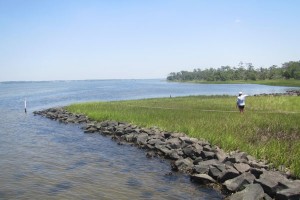
Carter Smith, 2015 NC Coastal Policy fellow, surveys the Pine Knoll Shores Aquarium rock sill. Photo courtesy Carter Smith
This opportunity is designed to foster research addressing a coastal policy issue within the state’s 20 coastal counties. Proposed topics should be related to one of these broad focus areas:
- Healthy coastal ecosystems
- Sustainable coastal development
- Safe and sustainable seafood supply
- Hazard resilience in coastal communities
- Environmental literacy and career initiation
Research and scholarly work conducted under this fellowship should include an exploration of the legal implications of the chosen policy issue. Email completed proposals to Lisa Schiavinato, Center co-director, at lcschiav@ncsu.edu by 4 p.m., Nov. 20, 2015.
The Center is a partnership among Sea Grant, the University of North Carolina’s School of Law, and the University of North Carolina Department of City and Regional Planning.
To learn more and to view the RFP, visit go.ncsu.edu/nv915d. Or contact Schiavinato at 919-515-1895 or lcschiav@ncsu.edu.
Publication Covers Tools, Risks Related to Coastal Hazards and Social Vulnerability
Contact:
Lisa Schiavinato, 919-513-1895, lisa_schiavinato@ncsu.edu
Posted Tuesday, June 16, 2015
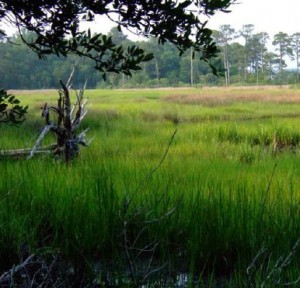
A North Carolina and Virgina team developed a pair of white papers on coastal risks and social vulnerability.
The North Carolina Coastal Resources, Law, Planning and Policy Center is offering a publication for local government officials whose communities are dealing with extreme weather events and increased flooding.
The paper, titled “Mapping Coastal Risks and Social Vulnerability: Current Tools and Legal Risks,” outlines the available data sets for social vulnerability, their current and potential use, and the associated legal risks in using that information for adaptation planning. It is part of a larger project about the law and policy issues associated with mapping social vulnerability that was funded jointly by North Carolina and Virginia Sea Grant programs.
Lisa Schiavinato, co-director of the Center and Sea Grant law, policy and community development specialist, is a co-author, with Heather Payne, from the University of North Carolina at Chapel Hill’s School of Law Center for Law, Environment, Adaptation, and Resources, or UNC CLEAR.
Together with the companion publication from the Virginia Coastal Policy Center at William & Mary Law School, “Mapping Coastal Risks and Social Vulnerability: Principles and Considerations,” these documents examine whether and how social vulnerability indices should inform policies in North Carolina and Virginia related to coastal flooding and sea-level rise.
“We hope that these publications can start a conversation on whether mapping social vulnerability is right for a community; and if so, what tools are available that would allow a local government to create a process that makes mapping a community effort,” Schiavinato says.
This research is intended to lay the groundwork to inform future work to integrate social vulnerability in adaptation planning that can meet the specific needs to rural and urban areas in both states.
The team consisted of representatives from North Carolina and Virginia. Members were from North Carolina and Virginia Sea Grant programs, the Center, UNC CLEAR, and Virginia Coastal Policy Center.
Read the white papers here:
- “Mapping Coastal Risks and Social Vulnerability: Current Tools and Legal Risks” at http://ncseagrant.ncsu.edu/ncseagrant_docs/products/2010s/SOVI_Tools_Risks.pdf
- “Mapping Coastal Risks and Social Vulnerability: Principles and Considerations” at http://law.wm.edu/academics/programs/jd/electives/clinics/vacoastal/reports/SOVI-%20Priciples%20and%20Considerations.pdf
Schiavinato Receives Outreach, Engagement Award
Contact:
Lisa Schiavinato, 919-515-1895, lisa_schiavinato@ncsu.edu
Posted Thursday, April 16, 2015
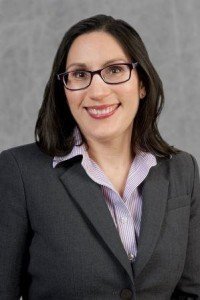 Lisa Schiavinato, North Carolina Sea Grant coastal law, policy and community development specialist, has been honored with an Outstanding Extension Service Award.
Lisa Schiavinato, North Carolina Sea Grant coastal law, policy and community development specialist, has been honored with an Outstanding Extension Service Award.
Her recognition is part of annual service-related awards given by the North Carolina State University Office of Outreach & Engagement.
“Sea Grant provides extension and research on a wide variety of topics — from coastal development to offshore energy — that have critical legal and policy components. Lisa’s work helps provide information to coastal leaders that enable them to make more informed decisions,” says Jack Thigpen, Sea Grant extension director.
In the nomination letter, Sea Grant Executive Director Susan White highlighted Schiavinato’s unique blend of legal training, appreciation of complex conservation issues and ability to work with a broad array of stakeholders.
Schiavinato develops partnerships with federal, state and local agencies to address North Carolina’s coastal and ocean-policy issues. In addition, she is co-director of the North Carolina Coastal Resources Law, Planning and Policy Center, an interinstitutional organization that coordinates and applies the legal, planning and policy expertise of the University of North Carolina system and Sea Grant to coastal issues in the state.
She holds a law degree and certificate in environmental and land-use law from the University of Florida, as well as a bachelor’s degree from the University of South Florida.
These awards encourage and recognize outstanding extension, engagement and economic development activities by NC State faculty and staff.
Sixteen individuals received honors this year.
Shape of the Coast Set for February
Contact:
Lisa Schiavinato, 919-515-1895, lisa_schiavinato@ncsu.edu
Posted Monday, Feb. 2, 2015
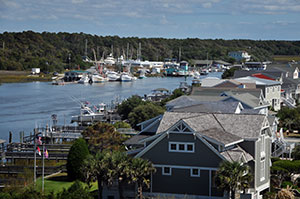
Recreational and commercial fishermen, residents, and businesses share the waterfront in North Carolina. Photo by Roger Winstead.
The 2015 Shape of the Coast is scheduled for 8 a.m. to 12:30 p.m. on Feb. 13, at the Friday Center in Chapel Hill. This event is part of the University of North Carolina School of Law’s Festival of Legal Learning.
The coastal session is co-sponsored by the N.C. Coastal Resources Law, Planning and Policy Center; North Carolina Sea Grant; and the UNC-CH School of Law.
“The 2015 Shape of the Coast program will include a great mix of topics for those interested in coastal policies,” says Lisa Schiavinato, Center co-director and Sea Grant coastal law, policy and community development specialist.
The discussions will include:
- “Examining Community Resilience in Virginia’s Coastal Zone Through a Social Vulnerability Index: Lessons for North Carolina” by Carlton H. Hershner, director of the Center for Coastal Resources Management at the Virginia Institute of Marine Science, and Sarah L. Stafford from the College of William & Mary; and
- “Legal and Policy Issues Associated with Incorporating Social Demographics in Resiliency Planning” by Schiavinato and Roy A. Hoagland, director of the Virginia Coastal Policy Clinic at the College of William & Mary Law School.
In addition, Frank Gorham, chair of the N.C. Coastal Resources Commission, will provide updates and a look ahead for his organization.
Also, William A. Raney, from Wessell and Raney, and Todd S. Roessler, from Kilpatrick Townsend & Stockton LLP, will recap federal and state coastal case law, legislation and litigation.
Attorneys may earn Continuing Legal Education credit for attendance at the program. Other professionals and members of the public also are invited to participate. Members of the public interested in attending should contact Schiavinato directly.
For details, visit www.law.unc.edu/cle.
2015 NC Coastal Policy Fellows Named
Contact: Lisa Schiavinato, 919-515-1895, lisa_schiavinato@ncsu.edu
Posted Wednesday, Jan. 28, 2015
Carter Smith and Jamie Heath are the 2015 N.C. Coastal Policy Fellows. The fellowship, supported by North Carolina Sea Grant and the N.C. Coastal Resources Law, Planning and Policy Center, is designed to foster research on a policy issue within the state’s 20 coastal counties during an academic semester.
“This year’s coastal policy fellows are poised to conduct policy research that will add to the body of scientific knowledge in North Carolina and also inform coastal science and planning decisions,” says Lisa Schiavinato, co-director of the Law Center and Sea Grant law, policy and community development specialist. “Their research will focus on issues that I hope will be of interest to our communities and leaders.”

Carter Smith
Smith is a doctoral candidate at the University of North Carolina at Chapel Hill’s Institute of Marine Sciences. Her academic advisor is Pete Peterson, an IMS researcher who studies coastal habitat valuation and restoration.
“My research quantifies how different coastal erosion protection mechanisms — such as bulkheads, revetments, marsh sills and natural marsh — perform during major storm events and what effect they have on local ecosystems,” Smith says. She will study how fishes and crustaceans are using the hard substrate provided by different shoreline stabilization structures for foraging and refuge to understand which structures offer the best habitat support.

Jamie Heath
Heath, who is working on her master’s in geography at East Carolina University, will study the effectiveness of the implementation of the State Wildlife Action Plan, or SWAP, in Carteret, Craven and Beaufort counties. Her advisor is Traci Birch, a faculty member in ECU’s geography, planning and environment department.
“The NC SWAP assesses the health of wildlife habitats, identifies problems, and outlines conservation actions. For this study I will interview local planners, natural resource managers and other groups that support SWAP implementation,” Heath explains. She plans to investigate how SWAP is being implemented, identify barriers to SWAP implementation, and determine possible tools and strategies that can be used to overcome these barriers.
Read about the experience of the 2014 fellows, Mikey Goralnik and Kim Hernandez, in the Holiday 2014 issue of Coastwatch. To learn more about the program, visit www.nccoastallaw.org.
